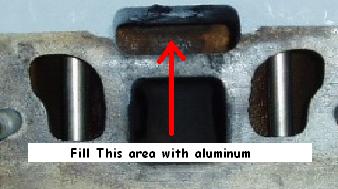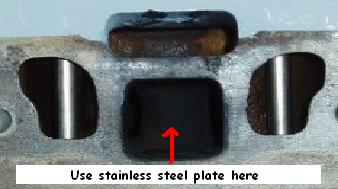


| Exhaust Crossover Port Matchings | ||
|---|---|---|
| With Head | And Manifold | Use Gasket |
| 1965-71 | 1965-71 | 1965-71 |
| 1965-71 | 1972-79 | 1972-79 |
| 1972-79 | 1972-79 | 1972-79 |
| 1972-79 | 1965-71 | 1965-71** |
Beacuse the hole in the early intake (and gasket) is larger than the hole in 72 and newer heads,
the exhaust is able to jump over the gasket and into the dead hole above the crossover.
Either fill in the 'blind hole' above the exhaust crossover on the 72 - newer head
or use a stainless steel block off plate.
Using the plate will make the crossover
not able to heat the under side of the intake manifold. Cold drivability may be affected.



Intake Manifold Crossover Matching
By: Jim Hand
The Q-Jet intake manifolds from 1967 to 1972 are functionally equivalent (except for type of chokes) and will bolt up to any 1965 and up heads and front cover. The 1973/74 manifolds are similar in function (and will bolt up) but have the EGR provision which requires a matching push rod cover (1973 to 1979). The 1975 and later Q-Jet manifolds have the EGR, restricted secondary openings, and poorer overall design.
There is a problem that occurs when using 1967 to 1971 manifolds with 1972 and later heads. The exhaust crossover opening on the right side of the manifold is much taller than the crossover opening in the head. Unlike the earlier head, the 1972 and later heads have an additional opening immediately above the small crossover port and this prevents either the early gasket with a large opening or the later gasket with the smaller opening from sealing the crossover. The solution is to use the small opening gasket (72 and later) with a thin stainless steel shim to cover the total area presented by the intake manifold opening. (Only stainless will work; other materials will burn through.) Use copious amounts of high temperature silicone seal on both sides of the gasket and shim. Incidentally, the opening is there only to save weight and does not need to be sealed.
I have included scale drawings of the head surfaces, the two gasket configurations, and the intake manifold crossover openings on the following page. The keys to the drawings are;
|
|
